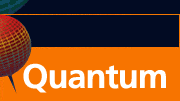CONTACTS
- Coordinator
Adolfo del Campo
-
Quantum Lunch Location:
T-Division Conference Room, TA-3,
Building 123, Room 121
 |


Quantum Institute: Visitor Schedule
The Quantum Lunch is regularly held on Thursdays in the Theoretical Division Conference Room, TA-3, Building 123, Room 121.
The organizing committee includes Ryan O. Behunin (T-4 & CNLS), Malcolm Boshier (P-21), Adolfo del Campo (T-4 & CNLS), Michael Di Rosa (C-PCS), Ivar Martin (T-4), Changhyun Ryu (P-21), Rolando D. Somma (T-4), Christopher Ticknor (T-1), and Wojciech H. Zurek (T-4).
For more information, or to nominate a speaker, contact Adolfo del Campo.
To add your name to the Quantum Lunch email list, contact Ellie Vigil.
Tuesday, November 6, 2012
3:00 PM - 4:00 PM
Speaker: Fernando Cucchietti
(The Barcelona Supercomputer Center (BSC))
Technical Host: Eddy Timmermans
TOPIC: Can we trust quantum simulators?
Abstract
Quantum simulators can compute the behavior of interesting quantum systems
exponentially faster than current computers. Because they are tailored to imitate
specific models, it is widely believed that simulators are much easier to implement
than universal quantum computers, which has fueled an explosive growth of
research in the field. However, unlike classical and quantum computers, quantum
simulators have no known way of self-correcting errors in a fault-tolerant manner:
the validity of their results can thus not be assured. Even more, the robustness
of quantum simulators in the presence of noise and at finite temperature is poorly
understood to date. Therefore, we do not know if, in realistic experimental situations,
quantum simulators can be truly more powerful than traditional computers.
I will start by proposing a formal definition of a useful quantum simulator (basically,
that it must satisfy four conditions: relevance, controllability, reliability, and efficiency).
Then, I will perform an analysis of reliability and efficiency in the presence of static
imperfections. I will illustrate these concerns with numerical simulations of a
paradigmatic example: a disordered quantum spin chain governed by the Ising
model in a transverse magnetic field. I will end with some speculation on what
research is needed (theoretical and experimental) to achieve a level of confidence
at least partially similar to that seen in computers with built-in error correction.
|


